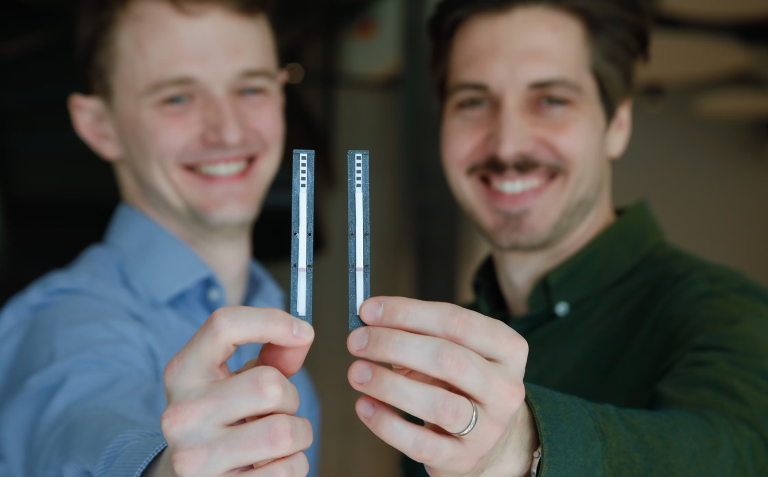
CSEM and MOMM Diagnostics partner to develop a rapid test for preeclampsia
Share this article
Among the various pregnancy complications, one of the most serious and potentially life-threatening conditions is preeclampsia affecting 3 to 8% of pregnant women. It is characterized by high blood pressure and protein leakage in the urine, which can lead to kidney failure, liver failure, seizures, stroke and even death. Women with a family history of preeclampsia, multiple pregnancies, pre-existing high blood pressure, and those who are obese or have diabetes are at higher risk.
The importance or early detection
The precise cause of preeclampsia remains unknown, but it is believed to stem from inadequate development of the placenta, which supplies crucial oxygen and nutrients to the developing fetus. When the placenta does not function optimally, it can result in restricted blood flow, causing damage to the mother’s blood vessels and organs.
Preeclampsia is a treatable condition and, in most cases, both mother and baby make a complete recovery. Regular prenatal care and early detection are key to preventing the serious complications associated with preeclampsia. Traditionally, preeclampsia is diagnosed through monitoring blood pressure, conducting urine protein tests, and evaluating organ function through blood tests. Unfortunately, these processes can be time-consuming, requiring multiple visits and causing anxiety for expectant mothers. The invasive nature of the testing procedures can be uncomfortable and unfamiliar, adding to the stress. The waiting period for test results can be emotionally challenging, heightening fear and anticipation. False negatives or delayed detection can occur, posing risks for both the mother and the baby. False positives, on the other hand, may increase healthcare costs due to unnecessary interventions and potentially hospitalizations.
Hope for pregnant women
Basel-based start-up MOMM Diagnostics specializes in developing highly sensitive rapid diagnostic tests. Their first test in development focuses on a novel in-vitro diagnostic test for the early diagnosis of preeclampsia, created in collaboration with medical professionals. MOMM’s multiplexed point-of-care testing method is quick, accurate, minimally invasive, and can detect the condition at its early stages when treatment is most effective.
“We analyze two very specific biomarkers in maternal blood,” says Mathias Wipf, CEO and co-founder of the company. “The assay is 50 times more sensitive than traditional rapid tests, detecting the two biomarkers in minute concentrations of several picograms per milliliter using antibodies. The specificity and sensitivity of the biomarkers used in our test are significantly higher than those of the current clinical diagnosis.”
MOMM Diagnostics received financial support from the Swiss Innovation Agency Innosuisse and from the Swiss Nanoscience Institute’s Nano Argovia program to work on an electrochemical biosensor for protein detection. The project also involved collaboration with FHNW University of Applied Sciences and Arts Northwestern Switzerland, as well as CSEM’s Tools for Life Sciences team.
Rapid test diagnostic carried out in doctor’s office
“The system resembles a pregnancy test but with electronic result analysis,” explains the entrepreneur Wipf. “This presents another advantage of the new test: The paper strip can be evaluated with a compact reader, providing a quantitative readout.” Since pregnant women regularly visit their gynaecologists for check-ups, the test can be conducted in their practices without the need to ship blood samples to specialized diagnostics labs. This saves valuable time – time in which treatment can already be started.
“CSEM’s interdisciplinary expertise has played a crucial role in the development of innovative point-of-care solutions. Together, we have already created cutting-edge technologies with the potential to improve healthcare outcomes for women worldwide. We are proud to continue our collaboration with the aim of advancing the development of such an innovative solution,” underlines Samantha Paoletti, Head of Research and Business Development, Life Science Technologies at CSEM.
CSEM and MOMM Diagnostics also collaborate within the European project NewLife, which focuses on developing a range of innovative technologies for monitoring the health of women and babies during pregnancy and early childhood.
“With these projects we financed the development of our prototype”, emphasizes Mathias Wipf. “Now, we are seeking investors to propel the technology to the next level. MOMM’s rapid preeclampsia test is projected to enter the market by 2025”. With its substantial market potential, Wipf anticipates double-digit million sales figures within the first five years. The Basel location, dedicated to R&D and production, is expected to expand to a team of 25 professionals.
📸 MOMM Diagnostics (f.l.t.r.): Christopher Wood and Mathias Wipf are holding samples of the preeclampsia test. ©CSEM
Source: Press Release